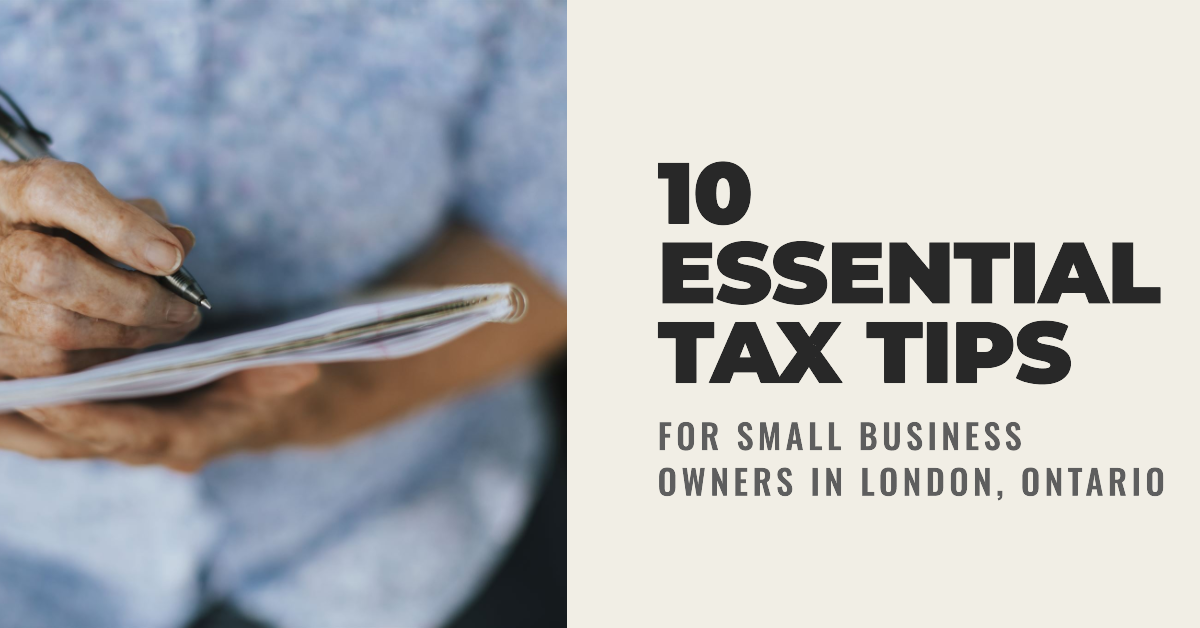Imagine running a small business is like navigating through a dense forest, where every step you take matters. In this intricate maze of tax laws and regulations, it’s crucial to have a clear path to financial success. That’s why as a professional small business accountant in London here to guide you through the wilderness with our 10 essential tax tips for small business owners in London, Ontario.
To begin your journey, you must first identify eligible deductions and credits that can save you money along the way. Keep detailed and organized records as your compass, ensuring accuracy and ease when it comes time to file taxes. Understanding the tax laws and regulations in Ontario will serve as your trusty map, preventing any unexpected obstacles.
While venturing alone may seem tempting, consider hiring a professional accountant or tax advisor who can be your trusted guide throughout the process. Together, you’ll plan ahead for tax deadlines and payments, avoiding any pitfalls that could hinder your progress.
With these essential tax tips at hand, you’ll feel empowered on this entrepreneurial expedition toward financial freedom. Let us help light up the path so that you can focus on what truly matters – growing your business amidst the vibrant landscape of London, Ontario.
Key Takeaways
- Familiarize yourself with tax laws and regulations in Ontario
- Keep detailed and organized records of business expenses and receipts
- Take advantage of deductions and credits to minimize taxable income and lower tax liability
- Consider hiring a professional accountant or tax advisor for accurate tax filings and maximizing deductions
1. Identify Eligible Deductions and Credits for Business Owners in London
Did you know that small business owners in London, Ontario can take advantage of several eligible deductions and credits to potentially save thousands of dollars on their taxes?
Tax planning strategies play a crucial role in maximizing tax deductions for your business. By strategically identifying eligible deductions and credits, you can significantly reduce your taxable income and ultimately lower your tax liability.
Some common deductions include expenses related to office rent, utilities, advertising, employee salaries, and even vehicle expenses if used for business purposes. Additionally, there are various tax credits available for small businesses in London, such as the Small Business Deduction or the Apprenticeship Job Creation Tax Credit.
To ensure you make the most of these opportunities, it’s essential to keep detailed and organized records of all your business expenses and receipts. Transitioning into the next section about keeping records will help you maintain accurate financial documentation that supports your deductions and credits throughout the year.
2. Keep Detailed and Organized Records in London
Make sure you keep detailed and organized records so that managing your finances becomes a breeze. Record keeping is essential for any small business owner in London, Ontario. By keeping track of your expenses and income, you’ll have a clear picture of your financial situation, making it easier to file taxes accurately and claim eligible deductions and credits. Not only will this save you time and stress during tax season, but it will also ensure that you are in compliance with the tax laws and regulations in Ontario.
To help you stay on top of your record keeping, consider using a table like the one below:
| Category | Expense Tracking Tips |
|---|---|
| Receipts | Keep physical or digital copies of all receipts |
| Mileage | Use a mileage tracker app or logbook to document business-related trips |
| Invoices | Create a system for organizing invoices, whether it’s through software or physical filing |
Having these records readily available will not only make tax time easier but also give you peace of mind knowing that everything is accounted for.
Now let’s transition into understanding the tax laws and regulations in Ontario.
3. Understand the Tax Laws and Regulations in Ontario
To navigate the financial maze of Ontario, you’ll need to get acquainted with the intricate web of tax laws and regulations that govern the land. Understanding these tax laws is crucial for small business owners in London, Ontario, as it can help you make informed decisions when it comes to tax planning and implementing effective tax strategies.
Here are three key points to consider:
- Familiarize yourself with the different types of taxes applicable to your business, such as income tax, sales tax (HST), payroll taxes, and property taxes.
- Stay updated on any changes or updates in the tax laws by regularly consulting reliable sources like the Canada Revenue Agency (CRA) website or seeking guidance from a professional accountant or tax advisor.
- Take advantage of available deductions and credits that can help minimize your taxable income and lower your overall tax liability.
By having a solid understanding of the tax laws and regulations in Ontario, you will be able to formulate effective tax strategies that benefit your small business. Consider hiring a professional accountant or tax advisor who can guide you through this complex process seamlessly.
4. Consider Hiring a Professional Accountant or Tax Advisor
Consider engaging the expertise of a professional accountant or tax advisor in order to navigate the complex financial landscape of Ontario and optimize your tax planning strategies. Hiring a professional can provide numerous benefits, such as ensuring accuracy in your tax filings and maximizing deductions to minimize your tax liability. They can also keep you updated with the ever-changing tax regulations, saving you time and effort in researching and understanding them yourself.
To further illustrate their value, here is a table highlighting some of the advantages of hiring a professional versus doing your own taxes:
| Benefits of Hiring a Professional | Benefits of DIY Tax Preparation | Importance of Staying Updated with Tax Regulations |
|---|---|---|
| Expertise in tax laws and regulations | Cost savings | Avoiding penalties for non-compliance |
| Maximizing deductions | Learning opportunity | Identifying new opportunities for savings |
| Time-saving | Control over process | Adapting to changing rules |
By considering these benefits, you can make an informed decision on whether to hire a professional or tackle your business taxes on your own. Now let’s transition into discussing how planning ahead for tax deadlines and payments is crucial for small business owners.
5. Plan Ahead for Tax Deadlines and Payments
Get ready to breeze through tax season by planning ahead for important deadlines and payments. By implementing effective tax planning and strategies, you can ensure a smooth process and avoid unnecessary stress.
Here are some essential tips to help you stay on top of your tax obligations:
- Mark Important Dates: Create a calendar or set reminders for key tax deadlines, such as filing dates and payment due dates. This will help you avoid late fees and penalties.
- Estimate Your Tax Liability: Stay proactive by estimating your tax liability throughout the year. This will allow you to plan your cash flow accordingly and make any necessary adjustments.
- Track Expenses: Keep meticulous records of all business expenses, including receipts and invoices. This will enable you to accurately claim deductions when preparing your taxes.
- Maximize Deductions: Familiarize yourself with eligible business deductions to minimize your taxable income. Consider consulting with a professional accountant or tax advisor to identify all potential deductions available to you.
By following these tax planning strategies, you can confidently navigate the complexities of taxes while enjoying the freedom that comes with organized finances.
Frequently Asked Questions
1. Can I deduct personal expenses as business expenses?
No, you cannot deduct personal expenses as business expenses. Doing so can have significant tax implications and may lead to penalties. It’s important to keep your personal and business expenses separate for accurate reporting.
2. How long should I keep my tax records?
To ensure compliance and be prepared for a tax audit, it is advisable to keep your tax records for at least seven years. This record retention period provides you with the freedom and peace of mind you desire as a small business owner in London, Ontario.
3. What are the penalties for not complying with tax laws and regulations in Ontario?
Not complying with tax laws in Ontario can result in severe penalties, including fines and potential legal consequences. It’s important to stay informed and meet your obligations to avoid these harsh punishments.
4. What are the consequences of missing tax deadlines or making late payments?
Missing tax deadlines or making late payments can result in penalties, interest charges, and even audits. Timely tax filing is crucial to avoid these consequences and maintain financial freedom for your small business.


